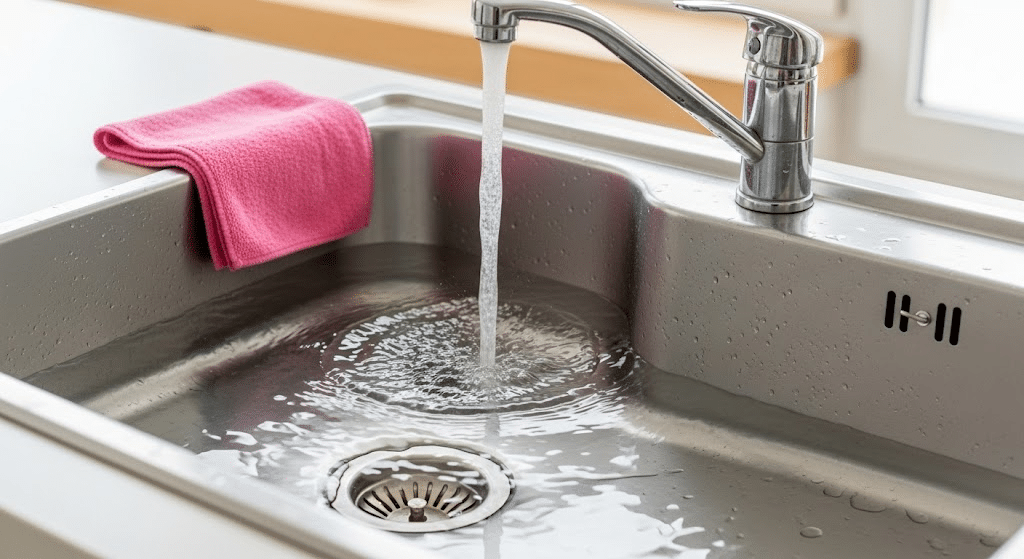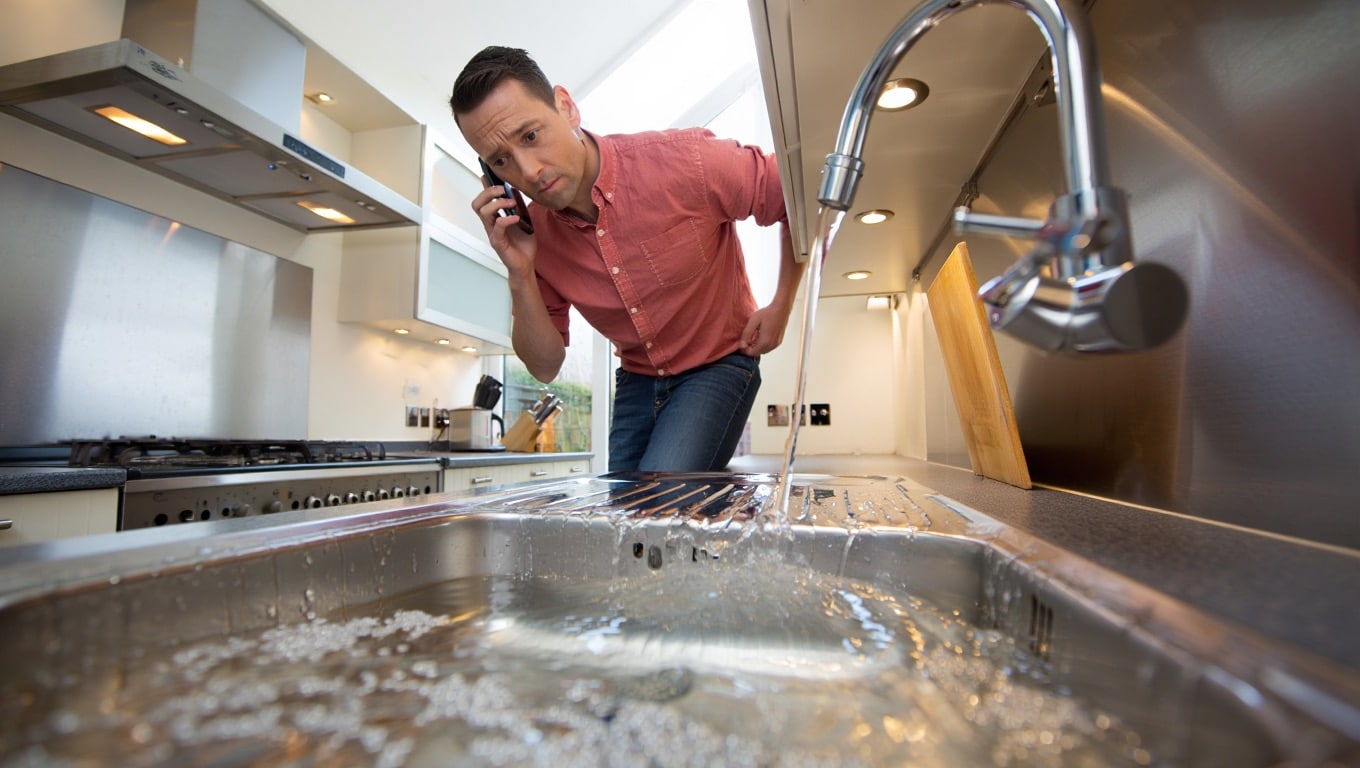7 Easy Ways to Fix a Slow-Draining Kitchen Sink

Is your kitchen sink taking forever to drain? It is a common problem that can be pretty frustrating, especially when you are trying to clean up after a busy meal.
A slow-draining sink does not always mean something is seriously broken, but it is definitely a sign that something is blocking the flow.
Luckily, you do not always need a plumber to fix it.
We will tell you easy methods to tackle the issue on your own and keep your sink running like new.
Let us dive into how you can fix that slow drain!
Causes of a Slow-Draining Sink
These are the main reasons why your kitchen sink might drain slowly.
- Food and Grease Buildup: When you wash food scraps or grease down the drain, they can stick to the pipes and block the water from flowing smoothly.
- Debris in the Pipes: Over time, things like soap, hair, and food can build up inside the drainpipe, causing a blockage.
- Clogged P-Trap: The P-trap is the curved pipe under the sink. If it gets blocked with debris, water can not drain properly.
- Garbage Disposal Issues: If you have a garbage disposal, food waste can get stuck, leading to slow drainage.
- Plumbing Problems: Sometimes, there could be bigger issues with the pipes, like cracks or tree roots blocking the flow of water.
Tools & Materials Required for Fixing a Slow-Draining Sink
To fix a slow-draining sink, you will need a few simple tools. Here is a list of what you’ll need to get started:
Methods to Fix a Slow-Draining Sink

Here are some simple methods you can try to fix a slow-draining kitchen sink:
1. Boiling Water
Sometimes, all it takes is boiling water to clear out minor blockages. Simply heat a kettle or pot of water until it boils, then carefully pour it down the drain.
The hot water will help melt any grease or soap that is stuck inside the pipes. It is like giving your sink a little steam clean!
If the water runs down faster after this, you know you have cleared up some of the mess.
2. Baking Soda and Vinegar
This is a natural trick that works wonders for breaking down grease and food build-up. Start by pouring about half a cup of baking soda down the drain.
Then, slowly pour in half a cup of vinegar. You will notice a fizzing sound, which is the ingredients working to lift out the gunk.
Let it sit for about 10-15 minutes, then rinse with hot water. It is a simple and safe method, plus it does not involve any harsh chemicals!
3. Plunger
You have probably seen this tool in action before. A plunger works by creating pressure to push any blockage loose.
To use it, just cover the drain with the rubber part of the plunger, ensuring it is sealed. Then, pump it up and down a few times.
The pressure should force whatever is blocking the drain to move. It is kind of like giving your sink a good push to get things flowing again.
4. Drain Snake or Auger
If the clog is stubborn, a drain snake or auger can be your next best friend.
This long, flexible tool can get deep into the pipes to break through those tough blockages.
You simply feed it into the drain, twist it to grab the clog, and pull it out.
It might seem like a bit of a challenge, but it is super effective for clogs that just will not budge.
5. Wet/Dry Vacuum
A wet/dry vacuum is a great tool for pulling debris out of the drain. Set the vacuum to wet mode, cover the drain with the vacuum hose, and turn it on.
It will suck up food, hair, or anything else blocking the pipe.
It is a bit like calling in the heavy-duty team to get the job done quickly and powerfully!
6. Clean the P-Trap
Under your sink, there is a curved pipe called the P-trap. It is designed to catch debris and keep odors from coming back up.
Over time, though, it can get clogged with food and other particles.
To clean it, place a bucket under the P-trap to catch any water.
Use a wrench to loosen the nuts and remove the trap, then clean it out. Once it is cleared, simply put everything back together, and your sink should drain like new!
7. Dish Soap and Hot Water
If you have a greasy mess in the sink, try using dish soap and hot water to break it down. Pour a good amount of dish soap into the drain, followed by hot water.
The soap will help break up grease, and the hot water will flush it out.
It is an easy and quick fix that works especially well for kitchen sinks.
Things You Should Never Put Down Your Kitchen Sink
Here are some things you should never put down your kitchen sink to avoid clogs and damage.
- Grease and Fat: Pouring grease or fat down the drain can cause it to harden and clog the pipes, leading to blockages.
- Coffee Grounds: Coffee grounds can stick together and create a thick paste, blocking the drain.
- Eggshells: Eggshells can break into small pieces and form a paste that builds up in the pipes, causing clogs.
- Fibrous Vegetables (e.g., celery, corn husks): Vegetables like celery or corn husks have stringy fibers that can get stuck in the pipes and cause a jam.
- Pasta, Rice, or Bread: These foods expand when they absorb water and can create significant clogs in the drain.
- Non-food Items: Never put plastic, paper, or wrappers down the drain. These things do not break down and can easily cause blockages.
When to Call a Professional Plumber?

It might be time to call a professional plumber when:
- If the Drain is Still Slow After Trying Fixes: If the water keeps draining slowly even after trying methods like boiling water or a plunger, it could mean there is a bigger problem.
- Bad Smells Won’t Go Away: If your sink smells bad and cleaning it does not help, it might be a sign of a deeper issue in the pipes.
- Frequent Blockages: If your sink keeps getting clogged even though you keep fixing it, there might be a serious blockage in the pipes that needs professional help.
- Leaks or Water Damage: If you notice water leaking under the sink or around pipes, it is time to call a plumber to fix it before it causes damage.
How to Prevent Future Clogs?
By following these simple tips, you can keep your sink in top shape and prevent future clogs from happening:
- Pour hot water down the drain once a week to help keep it clear of buildup.
- Place a strainer over the drain to catch food scraps and other debris before they go down.
- Don’t pour grease, fat, or large food scraps down the drain. Throw them in the trash instead.
- After using the sink, run hot water for a few seconds to help wash away any leftover soap or food.
- Run cold water and ice cubes through the disposal regularly to keep it clean and free from buildup.
The Bottom Line
Dealing with a slow-draining kitchen sink doesn’t have to be a hassle.
By following a few simple steps, you can often fix the problem yourself.
Just remember to avoid putting grease, food scraps, and other debris down the drain to prevent future clogs.
If these methods do not work, it might be time to call a professional plumber.
Keeping your sink clear and flowing smoothly does not take much; a little care goes a long way!
Do you have any secret tips for cleaning the kitchen sink? Do share with us in the comments below!
Frequently Asked Questions (FAQs)
Why is My Kitchen Sink Draining Slowly, Even After I Have Tried Fixing It?
Sometimes the blockage could be deeper in the pipes, or there may be an issue with your home’s plumbing that requires professional help.
How Often Should I Clean My Kitchen Sink Drain?
Cleaning your kitchen sink drain at least once a month is a good idea to keep it clear of buildup.
How Do I Know if My Garbage Disposal is Causing the Slow Drainage?
If the water drains slowly only when the disposal is running, it might be clogged. You can try cleaning it or call a plumber to inspect it.






